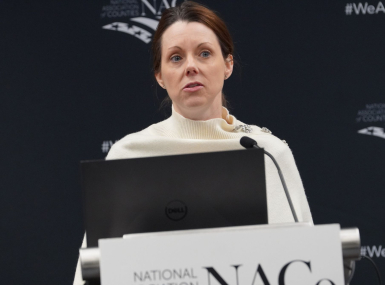USDA issues guidance on SNAP ABAWD work requirement changes under H.R. 1
Author

Julia Cortina

Kevin Moore
Upcoming Events
Related News

Key Takeaways
On October 3, the U.S. Department of Agriculture’s (USDA) Food and Nutrition Service (FNS) issued new guidance for implementing changes to work requirements for Able-Bodied Adults Without Dependents (ABAWDs) enacted under H.R. 1. Counties are responsible for administering SNAP in ten states: California, Colorado, Minnesota, New Jersey, New York, North Carolina, North Dakota, Ohio, Virginia and Wisconsin.
ABAWDs must work at least 80 hours a month or participate in qualifying programs to be eligible for SNAP benefits and are limited to receiving SNAP benefits for up to three months (known as a “time limit”) for failure to comply with these requirements. H.R. 1 expanded the definition of ABAWDs to include adults aged 18 to 64 (an increase from the previous range of 18 to 54) and to those with dependents ages 14 and up (previously, those with dependents were excluded). Additionally, the legislation eliminated time limit exceptions for veterans, individuals experiencing homelessness and former foster youth.
FNS clarified that the expanded ABAWD definition took effect immediately upon the law’s enactment on July 4, 2025, and that state agencies are required to provide written notice of these changes to affected households. In some states, the responsibility for notifying households has been delegated to counties.
The guidance also specifies that FNS will not hold states accountable for errors related to these new requirements in its Quality Control (QC) review process, which includes SNAP payment error rates, until November 1, 2025. After that date, any mistakes in applying ABAWD work requirements will count toward SNAP QC reviews. On October 17, NACo, along with the National Association of County Human Services Administrators (NACHSA), sent a letter to FNS urging an extension of this hold harmless period to allow counties and states additional time to make the necessary updates and inform their communities of these changes.
Next steps for counties
Counties administering SNAP benefits should review the guidance carefully to ensure compliance and avoid future QC impacts once the hold harmless period expires. Counties should work with their state to clarify notification of responsibilities and train staff on the updated ABAWD work requirements.
NACo will continue to monitor USDA guidance and share updates with counties as additional details become available. For additional information about H.R.1 implementation as it relates to counties and SNAP, read our resource here.
Resource
H.R. 1 and the Supplemental Nutrition Assistance Program (SNAP): What Counties Should Know

Related News

National Association of Counties Launches Initiative to Strengthen County Human Services Systems
The National Association of Counties (NACo) announces the launch of the Transforming Human Services Initiative, a new effort to help counties modernize benefits administration, integrate service delivery systems and strengthen county capacity to fulfill our responsibility as America’s safety net for children and families.

Congress seeking ‘common-sense solutions’ to unmet mental health needs
Rep. Andrea Salinas (D-Ore.): “Right now, it is too difficult to access providers … and get mental health care in a facility that is the right size and also the appropriate acuity level to meet patients’ needs.”

Federal-level child welfare priorities center on supporting foster youth, families
Child welfare experts outlined current priorities at the federal level, including better supporting foster care youth who age out of the system and recruiting more foster parents, at NACo’s Human Services and Education Policy Steering Committee meeting.